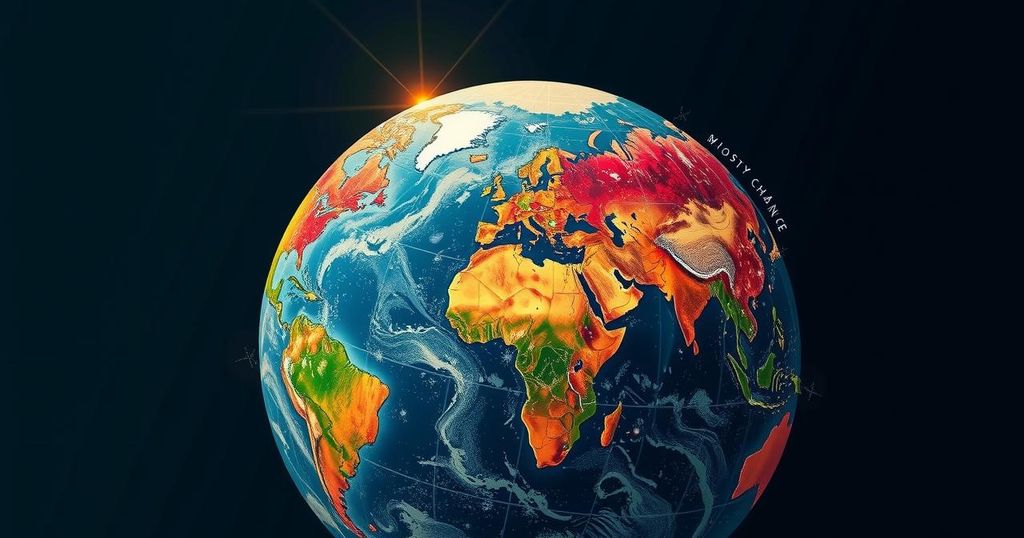Key Climate Science Report Reveals Urgent Actions Needed to Combat Global Warming Threats

The “10 New Insights in Climate Science” report reveals that global warming threatens international climate agreements, calling for urgent cuts to emissions to limit temperature rises. It highlights an increase in extreme weather events exacerbated by rising average temperatures and underscores the negative impacts on vulnerable populations. Recommendations include improving climate financing, fostering climate-resilient infrastructures, and implementing equitable policies for widespread acceptance and action against climate change.
The recent report titled “10 New Insights in Climate Science,” released by Future Earth, The Earth League, and the World Climate Research Programme, comprehensively outlines the alarming realities of climate change. Compiled from contributions by 80 researchers from 45 countries, this annual evaluation comes amidst consistently escalating global temperatures, which reached an average of 1.45 degrees Celsius above pre-industrial levels in 2023. Furthermore, the past 14 months have witnessed unprecedented sea temperature records, underscoring the dire trajectory the planet is on in relation to the 1.5 degrees Celsius target established by the Paris Agreement. The report aligns with findings from the Global Stocktake (GST), which underscores the urgency for a dramatic escalation in renewable energy deployment and energy efficiency improvements by 2030. It highlights that a reduction of global emissions by 28% over current projections is essential to maintain a global temperature rise below 2 degrees Celsius, while adherence to the more ambitious 1.5 degrees Celsius goal necessitates a 42% reduction. Among the report’s many significant insights, one of the most pressing is the increasing frequency and intensity of extreme weather events attributed to climate change. For instance, wildfires in Canada are now twice as likely due to rising temperatures, and heatwaves in South and Southeast Asia have surged in likelihood by thirty times. Heavy rainfall and flooding, too, are more probable and intensified, demonstrating the immediate impact of climate change. The report identifies two types of emissions as crucial: methane, which due to its potency and relatively short atmospheric lifespan, calls for urgent policy changes and technological advancements to curb its release; and aerosols, whose decline is seen as a double-edged sword—while improving air quality, their cooling effects mean that lower aerosol levels could hasten warming. Moreover, the report raises alarm over the fact that hundreds of millions currently inhabit climate conditions exacerbated by years of climate change. Regions most affected include lower-income and tropical countries, where population growth continues despite worsening conditions. Extreme heat has particularly damning effects on vulnerable populations such as pregnant women and newborns. The economic implications of extreme weather reflect a cascading harm influencing livelihoods and ecosystems alike. Predictably intensified natural phenomena, like El Niño, are projected to result in considerable financial losses, potentially amounting to trillions as we approach the century’s end. To counteract these risks, the report advocates for enhanced financing targeting adaptability and resilience in infrastructural development. Most critically, the human-induced alterations of ecosystems, notably the Amazon rainforest, prompt urgent restoration efforts rather than mere adaptations to climate changes. The report concludes by stressing the necessity for climate-resilient development, especially in urban environments, where greenhouse gas emissions can be significantly reduced through strategic policy, support for clean energy initiatives, and improved management of essential minerals for the energy transition. In conclusion, the authors caution that not only must climate policies grow in number and public acceptance, but they also must be perceived as equitable to foster mass mobilization. They emphasize that such changes will pave the way for substantial climate action ahead of future international accords. The authors express hope that their insights will influence delegates at COP29 in Baku, Azerbaijan, to commit to financial advancements, methane reduction targets, and enhance the clean energy transition economy by emphasizing fairness in policy-making. Hence, the report serves as a clarion call for immediate action in the face of escalating climate threats.
This report is particularly significant in the context of increasing global temperatures and the ongoing need for urgent climate action. The contributions from leading researchers reflect a gathering consensus on the urgent state of global warming and its multifaceted impacts. “10 New Insights in Climate Science” serves as both a warning and a guide for policymakers aiming to mitigate the disastrous effects of climate change while reinforcing commitments to international agreements aimed at limiting temperature rises. Notably, the backdrop of this report is the active engagement of nations at climate summits such as COP28, which aims to evaluate and bolster efforts towards achieving the targets set by the Paris Agreement. The findings underscore the pressing need for actionable strategies as countries face stark climatic realities that could undermine socio-economic structures globally.
The report underscores the tangible impact of climate change and the immediate need for adaptive measures and policies that respond to these challenges. As extreme weather patterns increase and threaten the livelihoods of millions, the interplay between emissions control and ecosystem preservation emerges as a critical area for action. Looking forward, fair and equitable climate policies will be essential to ensure broad public support and participation in the fight against climate change. Ultimately, the insights provided in this report illuminate key areas for improvement and action as the global community faces one of its most significant existential threats.
Original Source: impakter.com






